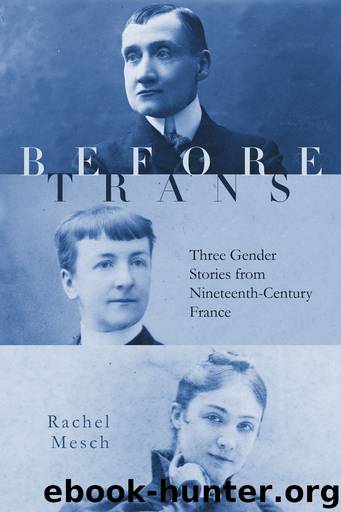Before Trans by Rachel Mesch

Author:Rachel Mesch
Language: eng
Format: epub
Publisher: Stanford University Press
Published: 2020-06-15T00:00:00+00:00
11
DEATH BY MARRIAGE
IN 1889, RACHILDE MARRIED Alfred Vallette and gave up pants-wearing for good. “I buried my life as a boy,” she later wrote of this transition.1 That verb should give us pause. Rachilde had already died a few times already: when she jumped into the pond to avoid marriage, when she assumed a pseudonym, and when she wrote Monsieur Vénus. Dying had become a metaphor for the transition to a new way of being in the world.
Vallette and Rachilde’s courtship is recorded in the letters that he sent to her between 1885 and 1889; her half of the correspondence has not survived. She published his letters several years after his death, under the title The Novel of a Serious Man. “Un homme sérieux” was the nickname Vallette had chosen for himself early on, in response to Rachilde’s cajoling. It became a term of endearment, of sorts. That the sum of his earnest letters to her equaled a “novel” suggests how far he always was from truly understanding the person whom he convinced to spend her life with him.
Vallette, an aspiring writer himself, was immediately smitten with Rachilde when he met her at the Bal Bullier in March of 1885. Intrigued by her fierceness of spirit and her daring self-presentation, he was also troubled by her choices: “Aren’t you afraid of breaking the law?” he asked.2
In one of their first exchanges, Rachilde asked her possible suitor his opinion of Monsieur Vénus. Vallette’s response was a rambling meditation that revealed a general bewilderment. Rachilde seems to have asked him whether he believed she was its author—evoking the Francis Talman rumors—or whether she merely signed her name to it. He responded that either way it was a mistake for her to associate herself with the work. The story, he wrote, was simply not credible: “That a working class florist could lose himself to this extent because he has a woman’s job, I don’t believe it.”3 This comment proved more than anything that Vallette was among those who did not understand the novel or the way of being that it meant to depict. As for the style, he found it fairly well written but of a “virile” nature that made him also doubt whether it was her voice at all.
It’s unclear whether Rachilde wrote back to Vallette at this point. Perhaps his incomprehension caused her to immediately lose interest; the correspondence breaks off abruptly. When the two come back into contact six months later, Vallette has a greater understanding about the person he is addressing, writing to Rachilde as “that strange double flower, neither man nor woman, perhaps.”4 By the end of the next letter, he has taken to calling her Mademoiselle-Monsieur. Various terms of gendered endearment flow throughout the letters: little brother, my dear marquise and my dear little king, dear little Enigma (f).5
Vallette seems attracted most of all by the comradery of their relationship: “You are the only woman, or woman writer, or ordinary woman, whom I can talk to while thinking as well,” he observed.
Download
This site does not store any files on its server. We only index and link to content provided by other sites. Please contact the content providers to delete copyright contents if any and email us, we'll remove relevant links or contents immediately.
| African-American Studies | Asian American Studies |
| Disabled | Ethnic Studies |
| Hispanic American Studies | LGBT |
| Minority Studies | Native American Studies |
Cecilia; Or, Memoirs of an Heiress — Volume 1 by Fanny Burney(31437)
Cecilia; Or, Memoirs of an Heiress — Volume 3 by Fanny Burney(31030)
Cecilia; Or, Memoirs of an Heiress — Volume 2 by Fanny Burney(30978)
The Great Music City by Andrea Baker(22606)
We're Going to Need More Wine by Gabrielle Union(18119)
Bombshells: Glamour Girls of a Lifetime by Sullivan Steve(13151)
Pimp by Iceberg Slim(12984)
All the Missing Girls by Megan Miranda(12824)
Fifty Shades Freed by E L James(12487)
Talking to Strangers by Malcolm Gladwell(11967)
Norse Mythology by Gaiman Neil(11952)
Crazy Rich Asians by Kevin Kwan(8403)
Mindhunter: Inside the FBI's Elite Serial Crime Unit by John E. Douglas & Mark Olshaker(7885)
The Lost Art of Listening by Michael P. Nichols(6521)
Enlightenment Now: The Case for Reason, Science, Humanism, and Progress by Steven Pinker(6442)
Bad Blood by John Carreyrou(5809)
The Four Agreements by Don Miguel Ruiz(5568)
Weapons of Math Destruction by Cathy O'Neil(5090)
We Need to Talk by Celeste Headlee(4915)
